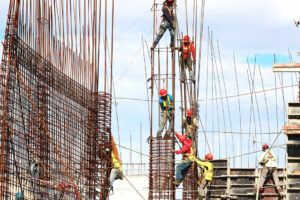PHL’s longer land lease may spur property buildup
A PROPOSAL to extend the land lease for foreigners to 99 years is expected to boost the Philippine real estate sector amid increased foreign demand.

By Beatriz Marie D. Cruz, Reporter
A PROPOSAL to extend the land lease for foreigners to 99 years is expected to boost the Philippine real estate sector amid increased foreign demand.
“The approval of the proposed measure should also help unlock land and property values especially in major growth areas outside Metro Manila including Central Luzon, Calaba (Cavite, Laguna, Batangas), Western Visayas, Central Visayas, Davao Region and northern Mindanao,” Joey Roi Bondoc, associate director at property consultant Colliers Philippines, said in an e-mail.
“Extending land lease is crucial as these foreign players bring a lot of capital to the Philippines,” he said. “This is important especially as we want to attract more investors going out of China and Taiwan.”
Last month, the Senate and House of Representatives separately approved on third and final reading bills that seek to extend the land lease limits for foreigners to 99 years from 75 years. Foreign investors will also be allowed to sublet properties unless barred by a contract.
The proposed law allows foreign private land leases related to tourism if the investments are at least $5 million. Of the amount, 70% must be infused into the project within three years.
Toby Miranda, associate manager at property consultancy firm Santos Knight Frank, said a longer land lease for foreigners bodes well for the development of real estate investment trusts (REIT).
“There are numerous advantages to extending land lease limits to 99 years, and they far outweigh the drawbacks,” he said in an e-mailed reply to questions. “On the upside, the REIT segment stands to benefit significantly from the expansion of properties, while a surge in foreign direct investment could lead to a more robust and stable economy.”
Extending the land lease for foreigners could also boost Philippine competitiveness.
“The extension of the land lease to 99 years is a critical development for foreign investors seeking to expand in the Philippines, offering a significant advantage over other Southeast Asian markets with shorter lease terms,” Mr. Miranda said.
He noted that Thailand is still exploring 99-year leases, while Vietnam allows up to 50 years with a one-time extension. Singapore and Malaysia already allow land leases of up to 99 years.
A 99-year lease would encourage property firms to expand their facilities to cater to foreign demand, Mr. Bondoc said.
“For the industrial sector, a longer land lease should result in more manufacturers investing massive foreign capital in the Philippines and further improvement of the country’s industrial supply chain,” he said.
“With more foreign manufacturers, we see property firms expanding their industrial parks and warehouses as they capture demand from these foreign locators,” he added.
In the hospitality sector, a 99-year land lease for foreigners could spur the development of more accommodation facilities, convention centers and tourist spots, Mr. Bondoc said.
“The bill’s enactment should result in the creation of massive townships offering leisure-oriented and resort-themed projects,” he said. “This should entice more foreign hospitality players to invest in the Philippines and look at other economic centers outside of Metro Manila.”
It may also push domestic and foreign companies to form joint ventures, increasing local businesses’ access to new skills, technologies and global expertise, Mr. Miranda added.
But the proposed law should ensure that local property players are not crowded out by foreign investors, Mr. Bondoc said.
“A longer land lease for foreigners in residential properties should also be studied on how it will impact appetite for condominium units, especially now that we are seeing massive unsold condominium inventory in Metro Manila,” he added.
Unsold condominiums in Metro Manila reached 75,300 units at the end of September, according to Colliers data.
A longer land lease could increase collaboration between local and foreign players, benefitting end-users, Mr. Miranda said.
“If local firms view foreign investors as competition rather than partners, it could hinder their growth,” he said. “But with the right mindset and strategic collaborations, the opportunities for progress and mutual success are boundless.”
















